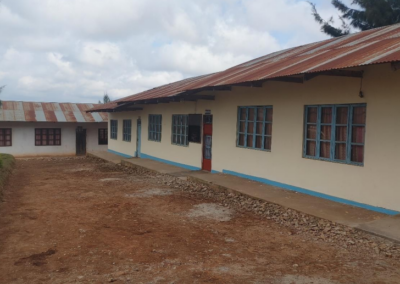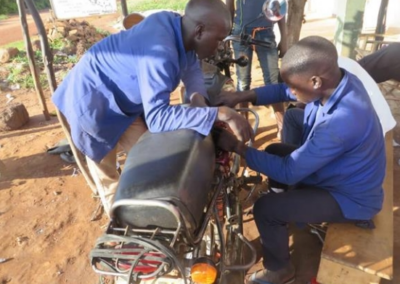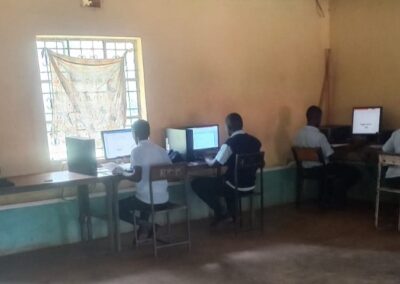The Lambwe Secondary School is in transition from a 4-year to a 6-year course (with 3 years of lower and 3 years of upper secondary education). In the same process, the school must include computer knowledge and skills in the school curriculum. The school therefore wants to purchase the resources to equip all students with ICT knowledge and skills that are necessary for the current labor market. Furthermore, teachers will be given access to up-to-date materials to equip students with up-to-date skills and knowledge in each teaching subject.
An amount of € 5,090 is needed to purchase the necessary equipment, such as computers, printers, and modems.
Amount required: € 5,090
Amount collected: € 5,090
Sponsors: Wilde Ganzen Foundation and KWA Bedrijfsadviseurs
Project information
The situation
Lambwe Secondary School is a government sponsored school, established in 1986 and has over 700 students. Because the school is located in a rural district, lessons in agriculture and horticulture are included in the curriculum. These courses should equip students with skills that will make them quickly employable in the district. The school offers a four-year education that will be replaced by the new education system, with 3 years of lower and 3 years of upper secondary education.
While the new education system is gradually being introduced in the cities, secondary schools in rural districts are lagging behind. The Competence Based Curriculum (CBC), which must be introduced at the same time, makes computer knowledge a compulsory subject. The school currently has over 700 students with only 7 computers and no internet. As a result, the use of computers by students is very limited and
makes it impossible to equip students with computer literacy, a compulsory exam subject.
The importance of the project
Computer literacy has become unavoidable knowledge as the world evolves. Every skill and knowledge students gain in school has got aspects of computer knowledge that needs to be sustained – “It’s has become infrequent spotting a job advert without a prerequisite for computer skills, if we are to prepare students for jobs, then ICT is sure inevitable”. The government of Kenya is currently putting the competency-based curriculum into practice. Government resources are limited and primarily go to schools in larger cities. The government therefore cannot equip the school with the necessary resources and parents cannot pay higher school fees to contribute to the purchase of the necessary equipment. At the same time, the need for technology is increasing, and it has become a requirement that students have computer skills to progress in their studies and careers.
The implementing organisation
Lambwe Secondary School is a government sponsored school, founded in 1986 and has over 700 students. It offers a four-year education that is to be replaced by a new education system with 3 years of lower secondary education, 3 years of upper secondary education. Because the school is located in a rural district, lessons in agriculture and horticulture are included in the curriculum.
The envisaged project results
The school is the only place in the (rural) sub-county, where the population has access to computers and internet. Youth both in and out of school are yet unable to benefit from any computer training program for two reasons. One is that they are expensive and Two is that there are no classrooms for instructions.
This project addresses the two gaps by providing classrooms for the instructions and offering the courses at more affordable prices.
At the completion of this project, the following results are expected;
- The 700 students enrolled annually with between 120 to 200 graduating annually, all will benefit from learned computer skills.
- About 60 out of school youths will be enrolled in computer courses every three months, and graduate fully equipped with computer skills, of which at least 15% expected to be employed immediately (as salesperson and cashiers).
- All students and teachers will have access to modern instructional material; thanks to the anticipated internet connectivity that this project will come with!.
- The autonomous position of the computer training program within the school will ensure community access to those facilities.
Chance of sustainability
Lambwe Secondary school is a government sponsored school. The schoolteachers are paid by the government and the school is a beneficiary of the free secondary education fund (Kes. 22,244 per student). This funding includes a contribution for maintenance and repairs that can be used for the maintenance of the ICT equipment. ICT lessons are mandatory in the Competence Based Curricular (CBC) system and the Ministry of Education is rolling out the ICT lessons that are currently examinable. The project will therefore help the school comply with the government’s Competence Based Curricular (CBC) system.
It gives graduate students the opportunity to continue (higher) education and increases their chances of finding work.
The required funds
The project costs are € 6,500. Of this amount, € 1,550 is contributed by the school for the construction/renovation of classrooms, electricity and internet installations and subscription costs. In addition, there is an indirect contribution from the government and the community consisting of tuition subsidies and tuition payments. The school only requests support for the purchase of the necessary equipment. An amount of € 4,950 is required for this!

Dear visitor,
We are grateful that you are willing to support us with a donation!
Please fill in the fields below and push the button PAY to transfer the amount by iDeal.




